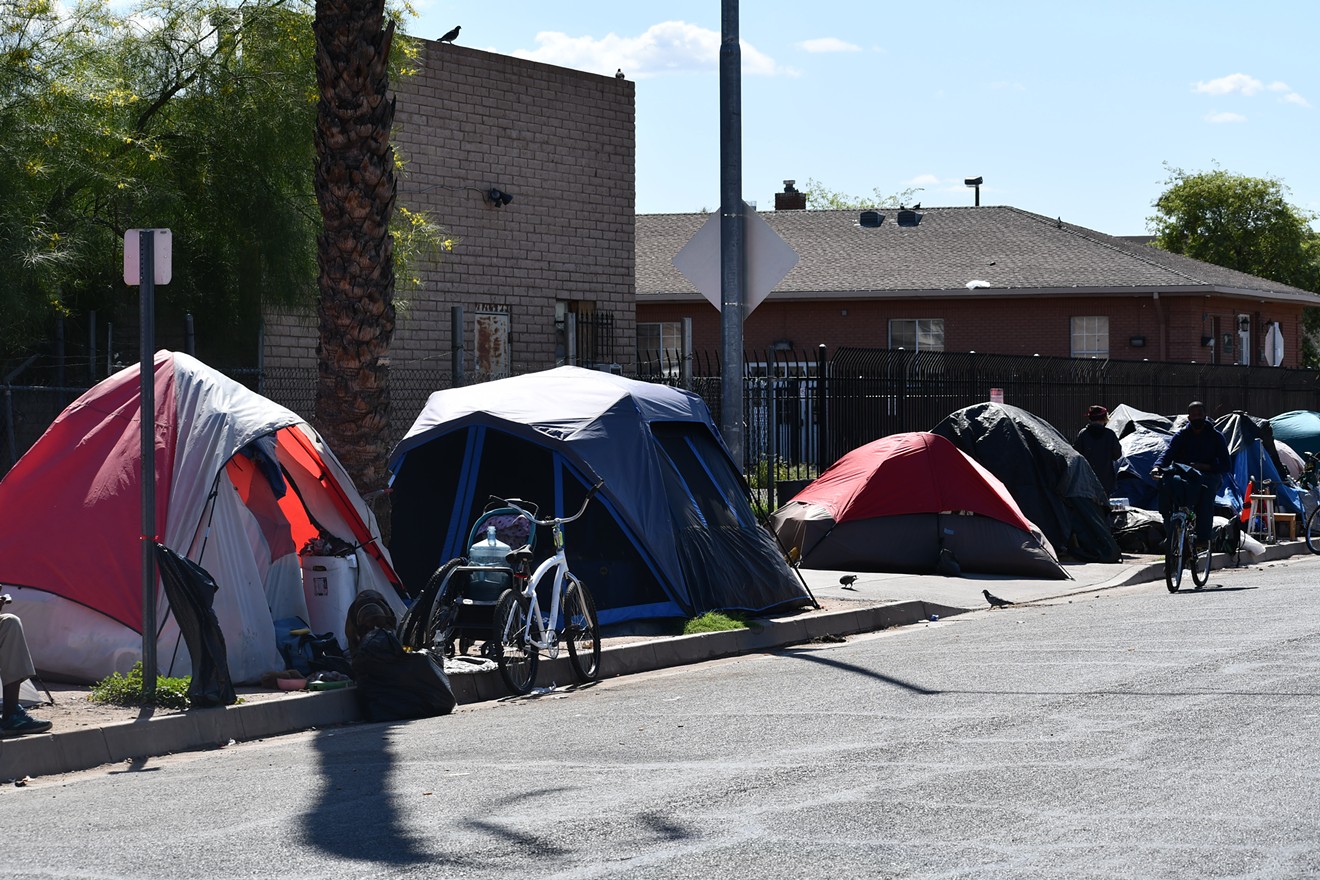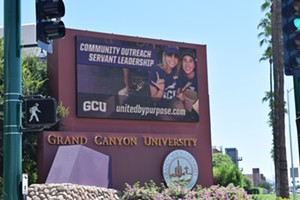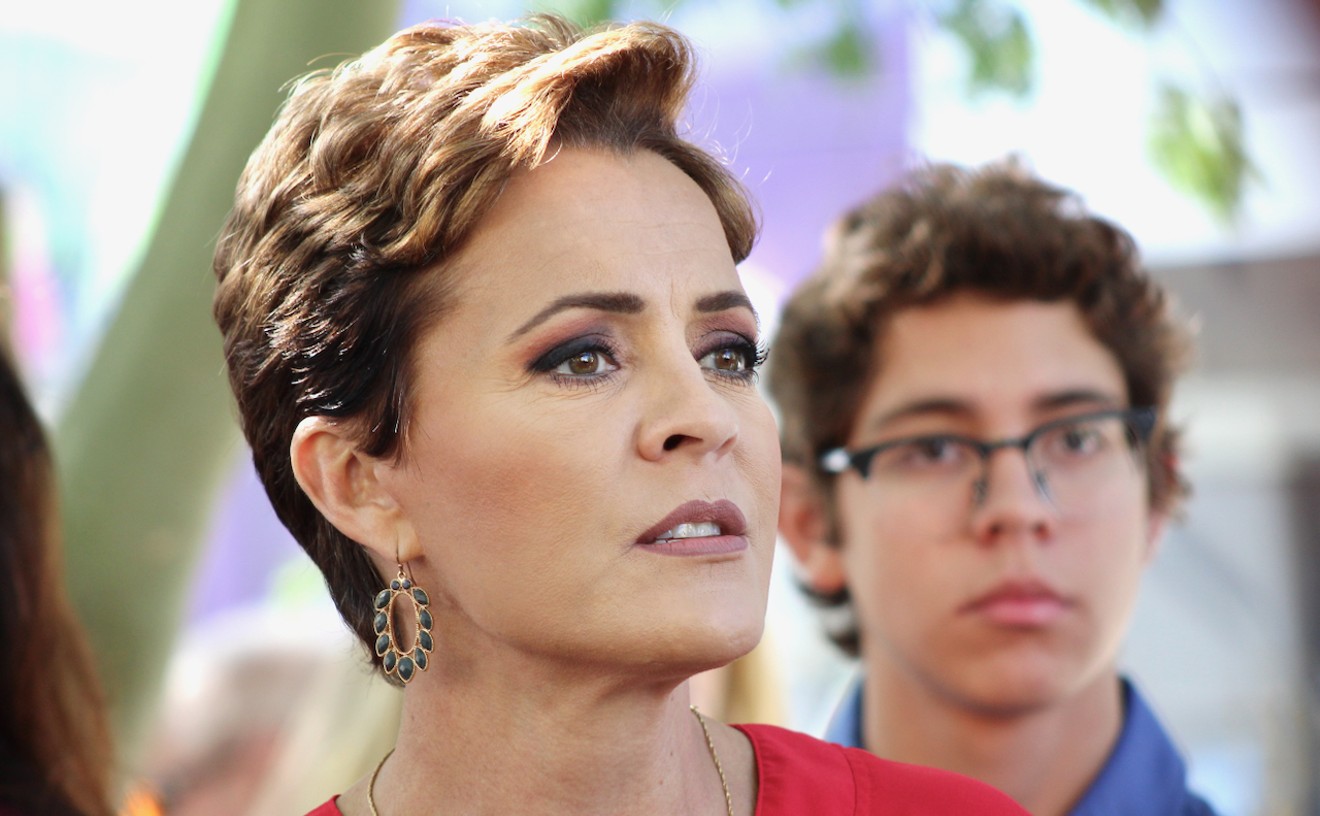During a recent daily briefing for Maricopa County's coronavirus response team, an employee brought up a potential deal with Grand Canyon University to house homeless people who are particularly susceptible to COVID-19.
After all, the private college operates a 155-room hotel that was indefinitely closed on March 23 to help prevent the spread of the new coronavirus.
But days after the promising update, the employee reported back that GCU would not be moving forward after all, according to internal briefing notes leaked to Phoenix New Times. The college instead opted to open its hotel rooms to first responders like police and firefighters.
In an emailed response to the county, a GCU representative wrote: "We are not confident that our facility or staff are equipped to safely house ill individuals. We also don’t believe we could ensure the safety of the healthy individuals staying or working around the hotel."
Maricopa County's failed attempt to strike an arrangement with Grand Canyon University highlights the challenges that officials face to shelter homeless individuals and families who face special risks during this global pandemic.
At the same time, the coronavirus has laid bare the systemic issues that have contributed to the county's growing homeless population, including a stark shortage of shelter beds to get people off the streets and affordable housing to help foster long-term stability.
Fields Moseley, spokesperson for Maricopa County, confirmed that attempts to connect with other hotels beyond Grand Canyon University have fallen through. He added: "We hope to have a few agreements in place very soon."
The notes obtained by Phoenix New Times indicate that the county has either secured or is close to securing a deal with one hotel to temporarily house the homeless, with two more "under consideration." Moseley confirmed as much, saying, "I know they’ve reached out to a number of hotels and got some positive responses, too." But he said the county cannot release the names or locations of those hotels.
A Maricopa County staffer who was present during the coronavirus response team's daily briefings said hotels — despite seeing their business disappear in the last month — have balked at the idea of entering into a paid contract with the government to shelter homeless individuals.
"Hotels we approach are okay to help until they find out who we want to help, and then they back out," the staffer said.
Maricopa County's efforts follow cities with large homeless populations that have opened empty hotel rooms to homeless people, including New York City, Los Angeles, and New Orleans. And San Francisco's Board of Supervisors passed an ordinance this week mandating the city to procure 8,000 hotel rooms for both the homeless and frontline workers by April 26.
There were more than 6,600 homeless people in Maricopa County in January 2019, the last time such a count was done. Roughly half of those people are unsheltered. Outside the Human Services Campus in downtown Phoenix, an area with a large homeless population, the county estimates that there are roughly 320 tents where people live.
Moseley did not respond directly when asked how many hotel beds the county would like to secure for the homeless.
The county has made some headway on adding shelter for homeless individuals, though not in the form of hotel rooms. On April 8, the county Board of Supervisors approved a lease for a Scottsdale building formerly used by The Leaf, a homelessness and social services organization, where it plans to operate 50 shelter beds for the elderly, sick, and immunocompromised. The Board also approved a $295,296 contract with Community Bridges to operate the new shelter.
Moseley noted that finding willing hotels will be just one of many challenges in getting people off the street during this crisis. Social workers will likely face problems convincing some homeless people to relocate.
"You can’t make people move," Moseley said. He added that there are other logistical considerations like determining how long hotels will be expected to serve the homeless and finding staffing for the converted shelters.
For some homelessness advocates, the difficulty in finding a place to protect unsheltered people from the coronavirus highlights the longstanding under-funding of housing and homelessness services in the region.
Phoenix's largest homeless shelter, Central Arizona Shelter Services (CASS), was already filling all of its 470 shelter beds long before the coronavirus was declared a global pandemic. Now, due to social distancing recommendations, CASS has transferred some of its shelter beds to a day resource center.
Just weeks before the crisis became pronounced in Arizona, Phoenix Mayor Kate Gallego signaled her support for a zoning permit that would allow CASS to double its bed capacity. But the move faces stiff opposition from businesses along the Madison Street corridor where CASS and other homelessness services are located.
Meanwhile, with some of the fastest rising rents in the nation, Arizona and the Phoenix metro area face a stark affordable housing shortage. According to a 2019 report from the Low Income Housing Coalition, Arizona has just 25 affordable housing units for every 100 extremely low-income individuals in the state.
"So much of these dynamics pre-existed COVID-19," said Amy Schwabenlender, the executive director of the Human Services Campus. "COVID-19 will maybe expose some of these structural issues and the gaping holes in our safety net."
[
{
"name": "Air - MediumRectangle - Inline Content - Mobile Display Size",
"component": "18478561",
"insertPoint": "2",
"requiredCountToDisplay": "2",
"watchElement": ".fdn-content-body",
"astAdList": [
{
"adType": "rectangle",
"displayTargets": "mobile"
}
]
},{
"name": "Editor Picks",
"component": "16759093",
"insertPoint": "4",
"requiredCountToDisplay": "1",
"watchElement": ".fdn-content-body",
"astAdList": [
{
"adType": "rectangle",
"displayTargets": "desktop|tablet"
},{
"adType": "rectangle",
"displayTargets": "desktop|tablet|mobile"
}
]
},{
"name": "Inline Links",
"component": "17980324",
"insertPoint": "8th",
"startingPoint": 8,
"requiredCountToDisplay": "7",
"maxInsertions": 25
},{
"name": "Air - MediumRectangle - Combo - Inline Content",
"component": "16759092",
"insertPoint": "8th",
"startingPoint": 8,
"requiredCountToDisplay": "7",
"maxInsertions": 25,
"watchElement": ".fdn-content-body",
"astAdList": [
{
"adType": "rectangle",
"displayTargets": "desktop|tablet"
},{
"adType": "rectangle",
"displayTargets": "desktop|tablet|mobile"
}
]
},{
"name": "Inline Links",
"component": "17980324",
"insertPoint": "8th",
"startingPoint": 12,
"requiredCountToDisplay": "11",
"maxInsertions": 24
},{
"name": "Air - Leaderboard Tower - Combo - Inline Content",
"component": "16759094",
"insertPoint": "8th",
"startingPoint": 12,
"requiredCountToDisplay": "11",
"maxInsertions": 24,
"watchElement": ".fdn-content-body",
"astAdList": [
{
"adType": "leaderboardInlineContent",
"displayTargets": "desktop|tablet"
},{
"adType": "tower",
"displayTargets": "mobile"
}
]
}
]










